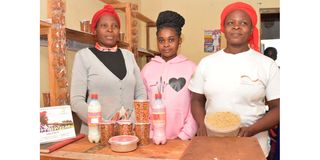Kakamega groups whiff cash from soya milk and yoghurt

Gaudencia Ongwen (left) Hope Rumona and Hazina Wambani display soya beans value-added products at their shop in Koyonzo Market, Matungu, in Kakamega County.
Koyonzo market on the Mayoni-Busia road in Kakamega County is known for food stalls, green groceries and chickens.
It is here that we meet Gaudencia Ongwen and 12 other women packaging soya crackies to be sent to a nearby school.
“Our duties, which are usually split, include receiving, weighing, sorting or marketing soya finished products,” says Ongwen, the chairwoman of Matungu CBO, which comprises 11 farmer groups.
They add value to soya beans to produce milk, yoghurt, crackies and Okara.
“Okara is made from the chaff that is obtained after sieving soy pulp. We use it to make feeds for chickens and other livestock,” she says.

Immaculate Malalaand her Mildred Okumbo with yoghurt made from soya beans.
The business was established in 2019, when group members realised that soya was highly nutritious and could boost body immunity, suppresses diabetes, allergies and some types of cancer.
Ongwen was taught to extract milk from soya beans by the Anglican Development Services (ADS) and 2Scale.
ADS linked Matungu CBO to the Kenya Agricultural and Livestock Research Organisation (Kalro) and Kenya Plant Health Inspectorate Services (Kephis).

Gaudencia Ongwen and Matungu CBO members extract milk from soybeans at Koyonzo Market Matungu in Kakamega.
“Members obtained SB19,3N and 6N seed varieties as these thrive in Koyonzo,” she says.
The group pumped in Sh10,000 from membership contributions into the project, with the money going towards rent and the purchase soya bean seeds and a manual grinder.
“We started the milk extraction in the traditional way, using wood and pestle,” she adds.
That was before ADS helped Matungu CBO acquire an electric grinder.
Production is two times a week, with the group sourcing raw materials from contracted farmers in Kakamega, Bungoma and Busia. The soy beans are sorted as soon as they are received from farmers.
“Soya is then soaked for eight hours. After that, it is removed and rinsed in clean water,” she says.
To get the milk, a cup of soya beans is added to a cup of water then ground to produce slurry.
Water is added to the slurry. Sieving follows to get the milk from the paste.
Two kilos of soya beans produces 20 litres of fresh milk.
Matungu CBO customers are mostly from Koyonzo and surrounding areas. Referrals come from as far as Mumias, Bungoma and Busia.
Schools also buy the products as the soya can be milled into flour and granulated with sorghum or millet to make porridge.
“Soya milk can also be dried and mixed with wheat flour to make crunches and crackies,” she says, adding that a litre of milk goes for Sh100.
About five kilometres from Koyonzo is Lung’anyiro market, where we meet Immaculate Malala. She is into soya yoghurt.

Hazina Wambani, Gaudencia Ongwen (pouring the mixture in the blender) with other Matungu CBO members show the extraction of milk from soya.
Malala gets 16 litres of yoghurt from two kilos of soya beans.
She first sorts and then dries the beans. Like Ongwen, she soaks the soya for eight hours. It is then blended and boiled for two hours on a low fire. Culture from yoghurt is then added.
“We add some sugar to sweeten it. Thereafter, it is put in a blender for mixing with vanilla or strawberry,” she says.
The yoghurt is packed in small quantities and goes for Sh20 to Sh100.
A distance away in Matungu is Eshembekho Shepamba, a group of 30 that started 2019 .
Group chairperson Julia Ogola says farming brought them together as they used to make organic fertiliser.
One time, Eshembekho Shepamba members met an agronomist who advised them on soya value-addition.
Ogola says soya beans can make highly nutritious dairy cow feed. Soya can also be milled to make flour that is good for granulation, especially when mixed with wheat to make porridge.
Erick Kataka, an agribusiness adviser at 2Scale, says before farmers engage in value-addition, they should do market research.
He says basic statutory permits like food handling and Kenya Bureau of Standards certificates are key in operating such a business.
Kataka adds that value-addition of soya has many benefits.




